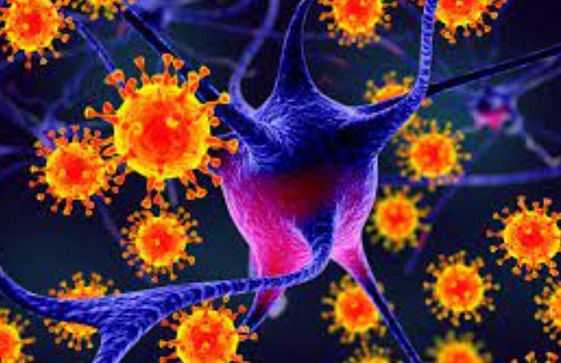Nikhil Prasad Fact checked by:Thailand Medical News Team Aug 12, 2025 6 months, 2 days, 5 hours, 25 minutes ago
Medical News: Researchers Uncover Dangerous Link Between COVID-19 Spike Protein and Parkinson’s
A new study by scientists from the Hunan University of Chinese Medicine, the Chinese Academy of Medical Sciences, Peking Union Medical College, and Shanxi University of Chinese Medicine has revealed alarming evidence that remnants of the SARS-CoV-2 virus may accelerate the progression of Parkinson’s disease (PD). Specifically, the receptor-binding domain (RBD) of the virus’s spike protein – which can linger in the brain long after infection – was found to worsen both motor and cognitive symptoms in experimental models.
 Spike Protein from COVID-19 Can Speed Up Parkinson’s Disease
Spike Protein from COVID-19 Can Speed Up Parkinson’s Disease
This
Medical News report explains that the RBD, when present in the brain, triggers harmful communication between immune cells called microglia and neurons. This interaction leads to the overproduction of a stress-related protein called RTP801, which plays a major role in nerve cell damage in PD. The spike protein also causes microglial mitochondrial damage, leading to the release of mitochondrial DNA (mtDNA) and activation of the cGAS-STING pathway – a key driver of inflammation.
Accelerated Nerve Damage and Symptom Decline
In tests using a Parkinson’s disease mouse model with genetic susceptibility and mild stress exposure, RBD injections into a brain area called the substantia nigra caused rapid worsening of PD symptoms. Mice developed more severe movement problems, loss of smell, anxiety-like behaviors, and memory issues within a week. Brain scans and electrical recordings confirmed disrupted communication between key brain regions and reduced neuron activity.
The study also found increased death of dopamine-producing neurons, greater build-up of toxic alpha-synuclein protein clumps, and more Lewy bodies – hallmarks of PD. The spike protein’s damage was comparable to that caused by prolonged chronic stress, which is already known to worsen PD.
RTP801 – The Key Culprit
Genetic experiments showed that removing RTP801 in mice protected them from much of the RBD-induced damage. These mice maintained better movement, stronger grip, less anxiety, and healthier brain cells. This confirmed RTP801 as a critical link between the spike protein and PD progression.
Further tests revealed that early after exposure, RTP801 rose first in microglia, not neurons. The microglia then released inflammatory molecules, especially IL-6 and IL-8, which triggered RTP801 overproduction in nearby neurons. Blocking these molecules prevented the harmful effect, suggesting possible drug targets.
A Harmful Feedback Loop
The spike protein’s damage to microglial mitochondria led to mtDNA leakage, activating the cGAS-STING-IFNβ pathway. This drove ongoing inflammation and maintained high RTP801 levels in neurons, creating a vicious cycle of nerve cell injury. Breaking this cycle by targeting RTP801
, IL-6/IL-8, or the cGAS-STING pathway could help slow PD progression in long COVID patients.
Conclusion
This groundbreaking research provides the first detailed mechanism showing how persistent SARS-CoV-2 spike protein fragments can worsen Parkinson’s disease. It identifies RTP801 and the microglia-neuron inflammatory loop as promising targets for future treatments. For people with PD who have had COVID-19 – or those at risk – these findings stress the need for careful neurological monitoring and early intervention.
The study findings were published in the peer reviewed Journal of Advanced Research.
https://www.sciencedirect.com/science/article/pii/S2090123225005892
For the latest COVID-19 news, keep on logging to Thailand
Medical News.
Read Also:
https://www.thailandmedical.news/news/german-study-finds-that-just-sars-cov-2-spike-protein-alone-can-trigger-brain-damage-similar-to-parkinsons
https://www.thailandmedical.news/news/parkin-a-protein-associated-with-parkinson-s-disease-found-to-be-elevated-in-individuals-infected-with-covid-19
https://www.thailandmedical.news/news/ferroptosis-possibly-behind-covid-19-induced-parkinson-s-disease-neurological-manifestations
